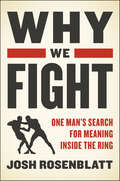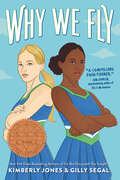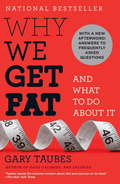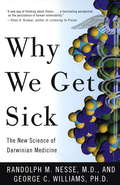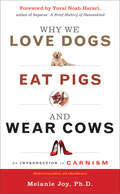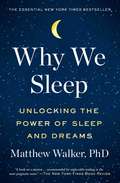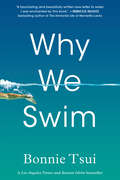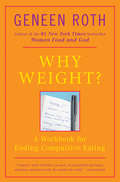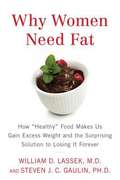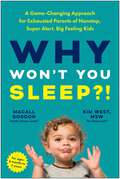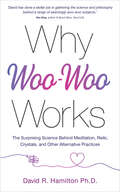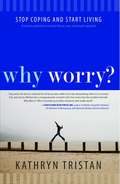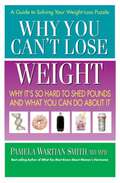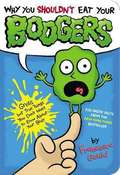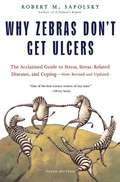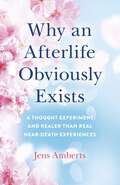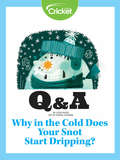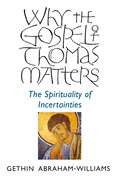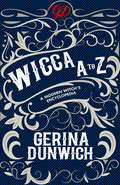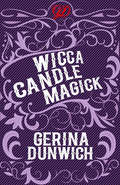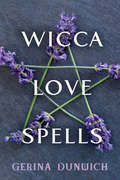- Table View
- List View
Why We Fight: One Man's Search for Meaning Inside the Ring
by Josh RosenblattBefore he was one of the most well-known yoga teachers in North America and an international hip hop artist, MC YOGI was a juvenile delinquent who was kicked out of three schools, sent to live at a group home for at-risk youth, arrested for vandalism, and caught up in a world of drugs,chaos and carelessness.At eighteen, fate brought him to his first yoga class. After discovering yoga, MC YOGI devoted himself to the practice. From traveling to India to study with gurus to living and learning with many American yoga masters, MC YOGI soaked in the knowledge that would revolutionize his entire life and put him on the path to healing, wholeness, and peace.Through technicolor stories of graffiti and guns, mystics and musicians, love, loss, and finding his soul’s purpose, MC YOGI’s journey is saturated in spiritual wisdom, illuminating the potential for transformation within us all.
Why We Fly
by Gilly Segal Kimberly JonesFrom the New York Times bestselling authors of I'm Not Dying with You Tonight comes a story about friendship, privilege, sports, and protest.With a rocky start to senior year, cheerleaders and lifelong best friends Eleanor and Chanel have a lot on their minds. Eleanor is still in physical therapy months after a serious concussion from a failed cheer stunt. Chanel starts making questionable decisions to deal with the mounting pressure of college applications. But they have each other's backs—just as always, until Eleanor's new relationship with star quarterback Three starts a rift between them.Then, the cheer squad decides to take a knee at the season's first football game, and what seemed like a positive show of solidarity suddenly shines a national spotlight on the team—and becomes the reason for a larger fallout between the girls. As Eleanor and Chanel grapple with the weight of the consequences as well as their own problems, can the girls rely on the friendship they've always shared?Praise for I'm Not Dying with You Tonight:A Barnes & Noble Book Club Pick"Compelling and powerful"—Angie Thomas, #1 New York Times bestselling author of The Hate U Give"A vital addition to the YA race relations canon."—Nic Stone, New York Times bestselling author of Dear Martin"Important reading for both teenagers and adults."—Hello Giggles"Not to be missed."—Paste Magazine
Why We Get Fat: And What to Do About It
by Gary TaubesNATIONAL BESTSELLER • &“Taubes stands the received wisdom about diet and exercise on its head.&” —The New York TimesWhat&’s making us fat? And how can we change? Building upon his critical work in Good Calories, Bad Calories and presenting fresh evidence for his claim, bestselling author Gary Taubes revisits these urgent questions. Featuring a new afterword with answers to frequently asked questions.Taubes reveals the bad nutritional science of the last century—none more damaging or misguided than the &“calories-in, calories-out&” model of why we get fat—and the good science that has been ignored. He also answers the most persistent questions: Why are some people thin and others fat? What roles do exercise and genetics play in our weight? What foods should we eat, and what foods should we avoid? Persuasive, straightforward, and practical, Why We Get Fat is an essential guide to nutrition and weight management.Complete with an easy-to-follow diet. Featuring a new afterword with answers to frequently asked questions.
Why We Get Sick
by Randolph M. Nesse George C. WilliamsThe answers are in this groundbreaking book by two founders of the emerging science of Darwinian medicine, who deftly synthesize the latest research on disorders ranging from allergies to Alzheimer's and from cancer to Huntington's chorea. Why We Get Sick compels readers to reexamine the age-old attitudes toward sickness. Line drawings.From the Trade Paperback edition.
Why We Get Sick: The Hidden Epidemic at the Root of Most Chronic Disease--and How to Fight It
by Benjamin BikmanA scientist reveals the groundbreaking evidence linking many major diseases, including cancer, diabetes, and Alzheimer's disease, to a common root cause—insulin resistance—and shares an easy, effective plan to reverse and prevent it. We are sick. Around the world, we struggle with diseases that were once considered rare. Cancer, heart disease, Alzheimer's disease, and diabetes affect millions each year; many people are also struggling with hypertension, weight gain, fatty liver, dementia, low testosterone, menstrual irregularities and infertility, and more. We treat the symptoms, not realizing that all of these diseases and disorders have something in common. Each of them is caused or made worse by a condition known as insulin resistance. And you might have it. Odds are you do—over half of all adults in the United States are insulin resistant, with most other countries either worse or not far behind. In Why We Get Sick, internationally renowned scientist and pathophysiology professor Benjamin Bikman explores why insulin resistance has become so prevalent and why it matters. Unless we recognize it and take steps to reverse the trend, major chronic diseases will be even more widespread. But reversing insulin resistance is possible, and Bikman offers an evidence-based plan to stop and prevent it, with helpful food lists, meal suggestions, easy exercise principles, and more. Full of surprising research and practical advice, Why We Get Sick will help you to take control of your health.
Why We Love Dogs, Eat Pigs, and Wear Cows: An Introduction to Carnism
by Melanie Joy&“An absorbing examination of why humans feel affection and compassion for certain animals but are callous to the suffering of others.&” —Publishers WeeklyWhy We Love Dogs, Eat Pigs, and Wear Cows offers an absorbing look at what social psychologist Melanie Joy calls carnism, the belief system that conditions us to eat certain animals when we would never dream of eating others. Carnism causes extensive animal suffering and global injustice, and it drives us to act against our own interests and the interests of others without fully realizing what we are doing. Becoming aware of what carnism is and how it functions is vital to personal empowerment and social transformation, as it enables us to make our food choices more freely—because without awareness, there is no free choice. &“An important and groundbreaking contribution to the struggle for the welfare of animals.&” —Yuval Harari, New York Times–bestselling author &“An exposé of the ideas, prejudices, and numbing of men and women who block out the unsavory details of what is involved in the creation and consumption of animal-based foods.&” —Spirituality & Practice &“With eloquence and humility, Melanie Joy appeals to the values that all of us already have and have always had. She reminds us of who we are.&” —Jonathan Safran Foer, New York Times–bestselling author &“Melanie Joy examines the psychological props that make it possible for us to adore some animals and eat others—and kicks them all aside.&” —Peter Singer, professor of bioethics at Princeton University and author of Animal Liberation Now
Why We Need Vaccines: How Humans Beat Infectious Diseases (Orca Timeline #6)
by Rowena RaeKey Selling Points Covers STEM topics, including the history, biology, evolution and effects of viruses and vaccine development. The book discusses misinformation, mental biases and how to think critically about information found online (or elsewhere). It challenges young readers to think about social and ethical responsibility when it comes to vaccination, and their responsibilities as individuals and members of a larger community. COVID-19 and the race to develop a vaccine for it put the topic of vaccines, vaccine mandates and vaccine hesitancy in the spotlight. The book includes career profiles of professionals in the field, such as a doctor, a nurse, a medical historian, an epidemiologist, a medical ethicist, an IT specialist and others. One profile is of two young people who volunteer with a nonprofit focused on training youth to become vaccine ambassadors in their schools and communities. The author is a biologist and science writer, and her mother was an infectious diseases doctor.
Why We Sleep: Unlocking the Power of Sleep and Dreams
by Matthew Walker&“Why We Sleep is an important and fascinating book…Walker taught me a lot about this basic activity that every person on Earth needs. I suspect his book will do the same for you.&” —Bill Gates A New York Times bestseller and international sensation, this &“stimulating and important book&” (Financial Times) is a fascinating dive into the purpose and power of slumber.With two appearances on CBS This Morning and Fresh Air's most popular interview of 2017, Matthew Walker has made abundantly clear that sleep is one of the most important but least understood aspects of our life. Until very recently, science had no answer to the question of why we sleep, or what good it served, or why we suffer such devastating health consequences when it is absent. Compared to the other basic drives in life—eating, drinking, and reproducing—the purpose of sleep remains more elusive. Within the brain, sleep enriches a diversity of functions, including our ability to learn, memorize, and make logical decisions. It recalibrates our emotions, restocks our immune system, fine-tunes our metabolism, and regulates our appetite. Dreaming creates a virtual reality space in which the brain melds past and present knowledge, inspiring creativity. In this &“compelling and utterly convincing&” (The Sunday Times) book, preeminent neuroscientist and sleep expert Matthew Walker provides a revolutionary exploration of sleep, examining how it affects every aspect of our physical and mental well-being. Charting the most cutting-edge scientific breakthroughs, and marshalling his decades of research and clinical practice, Walker explains how we can harness sleep to improve learning, mood and energy levels, regulate hormones, prevent cancer, Alzheimer&’s and diabetes, slow the effects of aging, and increase longevity. He also provides actionable steps towards getting a better night&’s sleep every night. Clear-eyed, fascinating, and accessible, Why We Sleep is a crucial and illuminating book. Written with the precision of Atul Gawande, Andrew Solomon, and Sherwin Nuland, it is &“recommended for night-table reading in the most pragmatic sense&” (The New York Times Book Review).
Why We Swim
by Bonnie TsuiA Best Book of the Season: BuzzFeed * Bustle * San Francisco Chronicle &“A fascinating and beautifully written love letter to water. I was enchanted by this book." —Rebecca Skloot, bestselling author of The Immortal Life of Henrietta LacksAn immersive, unforgettable, and eye-opening perspective on swimming—and on human behavior itself. We swim in freezing Arctic waters and piranha-infested rivers to test our limits. We swim for pleasure, for exercise, for healing. But humans, unlike other animals that are drawn to water, are not natural-born swimmers. We must be taught. Our evolutionary ancestors learned for survival; now, in the twenty-first century, swimming is one of the most popular activities in the world.Why We Swim is propelled by stories of Olympic champions, a Baghdad swim club that meets in Saddam Hussein&’s palace pool, modern-day Japanese samurai swimmers, and even an Icelandic fisherman who improbably survives a wintry six-hour swim after a shipwreck. New York Times contributor Bonnie Tsui, a swimmer herself, dives into the deep, from the San Francisco Bay to the South China Sea, investigating what about water—despite its dangers—seduces us and why we come back to it again and again.
Why Weight?: A Workbook for Ending Compulsive Eating
by Geneen RothPut an end to bingeing and dieting-forever!With the publication of her ground-breaking books, Feeding the Hungry Heart, and Breaking Free From Compulsive Eating, Geneen Roth has helped hundred of thousands of people win their battle against the destructive binge-diet cycle. Now this remarkable companion workbook shows compulsive eaters-in a constructive, non-judgmental way-how to stop using food as a substitute for handling difficult emotions or situations . . . and how to enjoy eating and still lose weight naturally. By using the liberating exercises and techniques developed by Geneen Roth in her highly succesful Breaking Free® workshops, dieters, who've tried every conceivable diet-losing weight again and again, only to gain it back-and bingers, who are harming their health, can learn wholesome, beneficial ways to achieve their goals. This proven program offers reassuring guidlines on:* Letting food become a source of pleasure rather than anxiety* Kicking the scale-watching the habit-forever!* Recognizing the difference between physical and emotional hungers* Learning to say no* Listening to, and trusting, your body's hunger and fullness signals* Distinguishing forbidden foods from those you truly want* Uncovering the conflicts that stand between your desire to lose weight and your urge to eat compulsively* Discovering other pleasures besides food
Why Women Need Fat
by Lassek William D.The groundbreaking discovery that shows why women need fat to lose fat. Why do women struggle so much with weight? Can women ever lose weight and keep it off? In this research-driven and counterintuitive book, an anthropologist and a public health doctor team up to answer those questions. Blending anecdotal evidence with hard science, they explain how women's weight is controlled by evolution-but more important- they reveal how a change in diet three decades ago may be the reason women today are bigger than their grandmothers were. Explaining why fat (both in our diet and in our body) is crucial to long-term health, the authors show not only why women tend (and need) to get heavier after having their first child, but also destroy cultural myths like "all fat is bad for you. " Providing a plan that can help any woman achieve a natural, healthy weight- without dieting- Why Women Need Fat not only gives women the tools they need to shed weight, but also a better understanding of why those last five pounds seem impossible to lose. .
Why Won't You Sleep?!: A Game-Changing Approach for Exhausted Parents of Nonstop, Super Alert, Big Feeling Kids
by Kim West Macall GordonHave you tried everything to get your child to sleep and nothing has worked? You are not alone. Researcher and sleep coach Macall Gordon and the Sleep Lady Kim West offer a tried-and-true approach to shifting sleep behavior that actually works . . . even when nothing else has. A tsunami of modern sleep training methods promise &“easy&” and &“quick&” results and for many parents and children, these methods work as intended. However, there is a large, exhausted group of parents whose children have sleep problems that are not responsive to those crying-based methods. These children tend to be more reactive, persistent, and perceptive than their peers. And when it comes to sleep, little ones with this kind of temperament put up a much, much bigger fight. They need a different approach. That&’s where Why Won&’t You Sleep? comes in. Based on extensive research and proven methods used with thousands of families just like yours, this guide gives you strategies tailored to your child&’s unique temperament. Readers will learn: Why popular sleep training techniques don&’t work for some children The strengths and challenges of your child&’s temperament traits Simple changes to your child&’s routine and environment that set you up for success How to create a plan for your child, using the time-tested approach that doesn&’t require leaving anyone alone to cry Tips, tricks, and workarounds for bedtime shenanigans, night wakings, co-sleeping, and more How to confidently push past plateaus and setbacks Along the way, Gordon and West provide much-needed encouragement, validation, and insights to bolster parents&’ self-confidence and resilience. Why Won&’t You Sleep?! gives you concrete answers to why sleep has been more challenging for these kiddos—and offers parents a much-needed dose of &“I&’ve got this!&”
Why Woo-Woo Works: The Surprising Science Behind Meditation, Reiki, Crystals, and Other Alternative Practices
by David R. HamiltonWhy should we meditate? How can crystals heal the mind and body? Why is visualization so powerful - and so effective?Alternative therapies, healing modalities, and spiritual practices are often referred to as 'woo-woo,' - but many of these approaches are actually supported by compelling scientific evidence.In this dynamic and thought-provoking book, David R. Hamilton PhD dives deeper into the true nature of consciousness and presents the cutting-edge research behind energy healing, crystals, meditation, and more.You'll discover:· The science behind some of today's most popular alternative practices· How your thoughts, emotions, and beliefs have healing power· The benefits of nature and a holistic approach to healing· A fascinating link between consciousness and human connection· The relationship between suppressed emotions and diseaseThe ideas behind some of these holistic therapies have been around for millennia - but now we have scientific evidence demonstrating how they can contribute to physical, emotional, and energetic healing too.It's time to embrace the truth: That woo-woo really does work.
Why Worry?: Stop Coping and Start Living
by Kathryn TristanKnock fear out of the driver's seat and take control of your own life through simple, proven strategies. There always seems to be plenty to worry about, and worry we do--from nagging concerns to full-blown anxiety. It's time to stop worrying and instead create a more peaceful, powerful, and purposeful life. Kathryn Tristan's hands-on, solution-oriented book empowers you to break free from constant fear, worry, and anxiety. She shows how to eliminate automatic doomsday thinking and take back control of your own life. This no-nonsense approach draws from a variety of disciplines to offer a comprehensive guide for rewiring your brain that includes restructuring how you think, easy relaxation exercises, simple lifestyle changes, and transformative spiritual practices. Through personal anecdotes and inspiring true stories, including self-assessment quizzes and the latest science, you'll discover the secrets to a worry-free existence, including how to: * recognize and eliminate inner trash talk and negative thinking; * create outlook makeovers to slash stress and worry; * master sure-fire worry busters; * and discover calm during chaos.
Why You Can't Lose Weight
by Pamela Wartian SmithIf you have tried diet after diet without shedding pounds, it may not be your fault. In this revolutionary book, Dr. Pamela Smith discusses the eighteen most common reasons why you can&’t lose weight, and guides you in overcoming the obstacles that stand between you and a trimmer body.Why You Can&’t Lose Weight is divided into four parts. Part I looks at lifestyle practices, such as insufficient exercise and sleep. Part II examines health disorders, such as food allergies and thyroid hormone dysfunction. And Part III discusses biochemical problems, such as insulin resistance and depression. For each difficulty discussed, the author explains how the problem can be recognized, how it contributes to weight gain, and how you can take steps towards a slimmer body. The last part guides you in putting together a customized, easy-to-follow weight-loss program.If you&’ve been frustrated by one-size-fits-all diet plans, it&’s time to learn what&’s really keeping you from reaching your goal. With Why You Can&’t Lose Weight, you&’ll discover how to lose weight and enjoy radiant health.
Why You Shouldn't Eat Your Boogers
by Francesca Gould Jp CoovertYou won't be able to resist picking this one! Itching to know what bugs live in your eyelashes, why you get goose bumps, or how ants can be used to heal a wound? Use this delightfully disgusting collection of kid-tastic facts to gross out your friends and relatives. In this abridged edition of the adult bestseller, readers will laugh, cringe and squirm over tons of bizarre facts about the human body.
Why Your Parents Are Hung-Up on Your Phone and What To Do About It
by Dean Burnett'Dean Burnett is the first old person who understands phones' Eleven-year-old Dermot, quoted in The Times'A wonderfully useful book, told with Dean Burnett's trademark wit and wisdom' - Adam Kay on Why Your Parents Are Driving You up the Wall“Can you get off your phone/ PS5/ Xbox!? NOW!” - Your parents (probably)I bet that you and your parents argue about phones.Maybe you want one, but your parents don’t agree? Or maybe you do have a phone, but your parents think you use it too much. Or even make you leave it downstairs at night when you want to scroll before sleep.Either way, the result is: arguments. Between you and your parents. About phones.Meet brain scientist and bestselling author Dean Burnett. He’ll show you why your parents are sometimes wrong about phones (and why, annoyingly, they can be a bit right), how you can both understand them a bit better and how you can stop arguing about them. You’ll learn about:Why turning off TikTok can be so hardHow video games can change your brain for the betterHow Snapchat can make us sad (and lots of other complicated feelings)Because screens can be a good thing. And a bad thing. But they’re definitely not worth getting hung up about.
Why Zebras Don't Get Ulcers,Third Edition
by Robert M. SapolskyThis edition features new chapters on how stress affects sleep and addiction, as well as new insights into anxiety and personality disorder and the impact of spirituality on managing stress and provides essential guidance to controlling our stress responses.
Why an Afterlife Obviously Exists: A Thought Experiment and Realer Than Real Near-Death Experiences
by Jens Amberts'Like a master attorney, Jens Amberts has marshaled an abundance of virtually irrefutable evidence in making the case for the thesis of his brilliant book, Why an Afterlife Obviously Exists. Basing his argument on four fundamental facts about near-death experiences (NDEs), Amberts has written a book that every serious student of NDEs, and especially skeptics, should be sure to read. On finishing it, I doubt any reader will not be convinced that death is not a dead end.' Kenneth Ring, Ph.D., Professor Emeritus of Psychology, University of Connecticut, author of Lessons from the LightWhy an Afterlife Obviously Exists is a philosophical argument demonstrating why the existence of an afterlife is beyond astronomically likely and hence empirically certain. It explains how we have every rational reason to think that people who have near-death experiences are not only telling the truth, but the book also argues that near-death experiencers are thoroughly justified in knowing that they visited the actual afterlife.
Why in the Cold Does Your Snot Start Dripping?
by Lizzie WadeThe Director of the Sinus Center at Johns Hopkins University explains why our noses start to run in cold weather.
Why is Mommy's Tummy So Big? Questions Children Ask About the Facts of Life
by Mary AtkinsonWhy is Mommy's tummy getting so big? Why can't I remember being born? Why do babies cry so much? Why do boys and girls look different? Why do some children grow up faster than others? Why does my big brother like girls? Why does Dad shave his face? Why do grown-ups kiss for so long?
Why the Gospel of Thomas Matters: The Spirituality Of Incertainties
by Gethin Abraham-WilliamsBy setting selected sayings from the Gospel of Thomas alongside the disciple's own words from the Fourth Gospel, this book challenges the myth of 'doubting Thomas', arguing that 'incertainty' is an essential element of any authentic faith experience. In an age of increasing anti-semitism and religious intolerance, it also affirms the importance of the Gospel of Thomas in recovering the essential Jewishness of Jesus. Far from undermining the Christian tradition of the Church and its canonical scriptures, this book shows how the Gospel of Thomas complements both, inviting the reader to reconsider the healthy significance of the Apostle of the Enquiring Mind.
Wicca A to Z: A Guide to the Magickal World
by Gerina DunwichA must for the modern Wiccan’s library, this comprehensive resource explores the fascinating world of Witchcraft from ancient legend to contemporary paganism. No aspect of Wicca is overlooked, with well over 500 entries and numerous illustrations on the traditions, rituals, folklore, amulets and talismans, herbs and gemstones, and pagan goddesses of the Wiccan lifestyle. This unique encyclopedia is an excellent guide for all who are interested in Goddess worship, folklore, the New Age, the occult sciences, and the Wiccan Craft as a positive spiritual path and way of life.
Wicca Candle Magick
by Gerina DunwichHow to craft and consecrate candles and use their magick to cast spells, make wishes come true, increase luck, and spark psychic powers. Discover the mystical powers of the candle, used throughout the ages as an indispensable tool for setting the proper atmosphere for spellcasting, divination, meditation, banishing darkness, and communicating with the dead. Sections include sacred candle colors of the gods and goddesses, crystals and gemstones, Voudoun candle magick, and the making of sacred oils for candle blessing rituals. Easy-to-follow instructions will guide the modern witch into crafting and consecrating various types of candles such as Witch Candles, Healing Herb Candles, Rune Candles, Magick Symbol Candles, and Voodoo Candles. Modern Wiccan expert Gerina Dunwich also discusses candle omens and provides a collection of powerful folk spells and incantations for nearly every purpose. Wicca Candle Magick is an essential resource for today&’s everyday goddesses. &“Straightforward and practical.&”—Brigid&’s Flame
Wicca Love Spells
by Gerina DunwichHow to use this age-old art to attract the right lover or spouse, make yourself more desirable, and properly charge the atmosphere for love to bloom. In the ever-shifting landscape of modern relationships, the ancient art of love magick, practiced for countless centuries on every continent by every culture in one form or another, remains an indispensable aspect of modern witchcraft. Love potions and love spells are two of the most popular and best-known examples of love magick, but there are many other aspects as well, including charms, amulets, talismans, herbs, omens, astrology, palmistry, and the divinary arts, to name just a few. Wicca Love Spells reaches far beyond the limits of traditional love spells and presents a magickal journey of love from ancient times to modern times. Everything you need to know about the magickal side of love can be found within this book.
